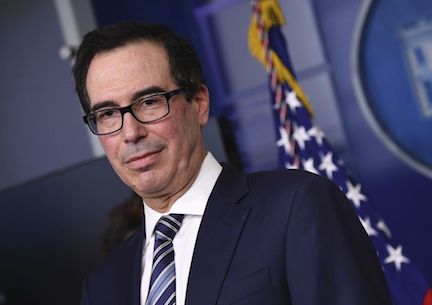Mnuchin rebuffs airlines, holds firm on repayment for rescue
Treasury Secretary Steven Mnuchin is not budging on strict repayment guidelines for airlines wanting taxpayer aid, according to people familiar with the matter, dashing the industry’s hopes for leniency.
U.S. carriers seeking to negotiate payback demands on federal funding for payroll assistance now see very little room for movement with Treasury officials, said the people, who asked for anonymity to discuss private negotiations. The nation’s four largest carriers were reviewing grant offers received over the weekend. At least three discount airlines are to discuss proposals with the agency Monday, one of the people said.

Treasury is facing pressure to start doling out money soon to an airline industry losing billions of dollars and facing a drop-off in passengers of 95%. U.S. airline stocks fell, out-pacing a decline in the broader market and headed toward the first drop after last week’s rebound.
Mnuchin’s team is requiring large carriers to repay 30% of the grants through low-interest loans due within five years. The agency said it has received 230 applications for aid from passenger carriers of all sizes. It’s working with 12 that would get more—in some cases much more—than $100 million each, and is discussing what sort of terms it will require in return.
Carriers eligible for payroll aid that would receive less than $100 million won’t have to repay any of the money, the agency said.
A Treasury spokeswoman declined to comment.
Mnuchin has repeatedly said the aid package “is not a bailout.” The Treasury chief is rejecting the notion that airlines could get a government bailout similar to what automakers and some banks received during the global financial crisis more than a decade ago.
However, airlines, unions and some key lawmakers involved in the $2 trillion package that became law on March 27 said the intent was that the payroll assistance portion would go directly to carriers and their contractors without restrictions. Passenger carriers are set to get $25 billion, cargo airlines $4 billion and airline contractors $3 billion in payroll funds.
The law gives Mnuchin the option to require “appropriate compensation,” but doesn’t require it.
Larger airlines remain unhappy that they’ll have to repay the 30%, but are increasingly resigned to that arrangement, said people familiar with their thinking.
At least some of the talks between airlines and the Treasury appeared close to wrapping up, said another person.
Low-Fare Brands
Southwest Airlines Co. worked “very hard with the U.S. Treasury Department over the weekend,” Chief Executive Officer Gary Kelly told employees in a weekly recorded message. “I hope to have something to announce on that soon.”
The carrier, which flies the most passengers in the U.S., is preparing for a variety of scenarios, ranging from a quick travel rebound next year to one that takes four to five years in a real recession, Kelly told workers in a separate video.
“We need to be prepared for a very prolonged, sluggish travel environment,” he said. “That’s where having plenty of cash, low debt, a low cost structure and low-fare brand becomes so important.”
Southwest, American Airlines Group Inc. and United Airlines Holding Inc. didn’t comment on talks with the Treasury, while Delta Air Lines Inc. didn’t return a call for comment.
Much remained unknown about how the Treasury intends to structure the aid package.
The payroll assistance was designed to cover the six-month period through the end of September and can only be used to pay wages and benefits. Airlines accepting the money must agree not to lay off employees during that period.
Congress directed that the allotments be based on wages and benefits paid in the second and third quarters of last year. However, far more than 12 airlines paid salaries totaling more than $100 million, according to Department of Transportation data.
At least 18 passenger carriers spent more than $100 million during the period a year ago, according to the data. They ranged from Mesa Air Group Inc. at $100.3 million to Delta with $6.96 billion.
With airlines canceling thousands of flights a day and tens of thousands of employees agreeing to unpaid furloughs, it may be possible for carriers to spend far less than usual on wages while still keeping their workforce.
The passenger sector of the airline industry paid more than $30 billion in wages and benefits in the period a year ago, which is more than the $25 billion set aside by Congress for such payments. And that $30 billion doesn’t include more than 100 carriers that are too small to report data to DOT.
Similar Stories
JAS Worldwide signs SPA with International Airfreight Associates B.V.
JAS Worldwide, a global leader in logistics and supply chain solutions, and International Airfreight Associates (IAA) B.V., a prominent provider of comprehensive Air and Ocean freight services headquartered in the…
View Article
LATAM is once again part of the Dow Jones Sustainability Index
View Article
CPaT partners with Wizz Air, Europe’s leading ultra-low-cost airline, to enhance aviation training
View Article
Air Transat takes off to Tulum from Montreal and Quebec City
View Article
Air France KLM Martinair Cargo achieves record online sales and accelerates commercial transformation
View Article[Freightos Weekly Update] Frontloading continues to put pressure on transpacific rates
Transpacific ocean rates increased slightly last week and are about 15% higher than at the start of December as frontloading ahead of expected tariffs is keeping vessels full.
View ArticleGet the most up-to-date trending news!
SubscribeIndustry updates and weekly newsletter direct to your inbox!





